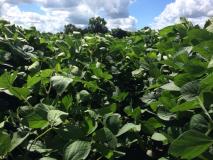MAKING THE MOST OF SOYBEAN SEED SELECTION
Jan 13, 2020

“It used to be simple to pick soybean varieties,” said Craig Loen, Federated agronomist at the Osceola location. “Today we need to be knowledgeable of all the technologies available in the marketplace … because using the right technology on your farm can make a big difference in your disease and weed management options,” he added.
To begin the soybean seed selection process, consider these questions and variables:
- * What are your primary weed concerns?
- - What were the weed issues with the previous crop?
- * Do your fields have disease concerns (e.g., white mold)?
- * What’s your rotation plan (e.g., corn / bean, bean / bean, prevent plant / bean)?
- * Do you want to avoid crop response to weed control applications?
- - What soybean seed traits will help reduce the need for burner chemistry that can cause crop response?
- * What soil types are in your fields (e.g., variable, sand, silt, heavy, clay, wet soils)?
- * What form of tillage are you using (e.g., no till, wide, narrow, drilled, conventional)?
Based on your answers to those questions, the next step is to consider what trait (technology) package fits your needs:
- * Conventional soybeans
- * Roundup Ready 2 Yield® (RR2) soybeans
- * Liberty Link® (LL) soybeans
- * Liberty Link® GT27™ glyphosate tolerance (LLGT27) soybeans
- * Roundup Ready 2 Xtend® (dicamba) soybeans
- * Enlist E3™ (2,4-D) soybeans
Loen pointed out that “there are several different kinds of soybean traits available in the marketplace … look at different varieties … look for disease suppression, field tolerances, cyst nematode races, white mold, [and other] agronomic chart ratings.”
The good news is you don’t have to figure this out alone. Contact your Federated Agronomist to learn more about the chemistries in the various soybean technologies. Your agronomist will help you decide what traits and varieties are best suited to your specific farming operation.